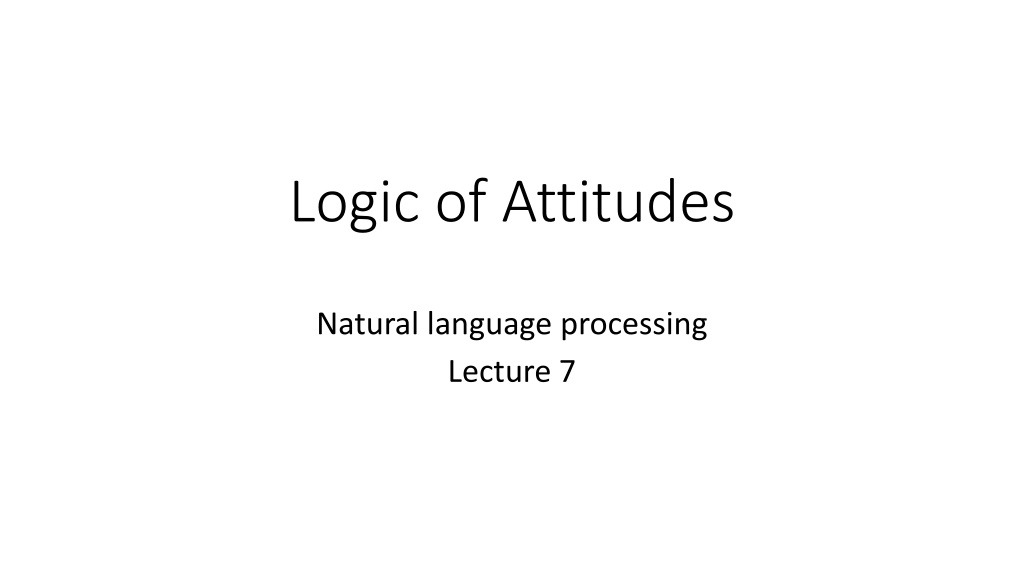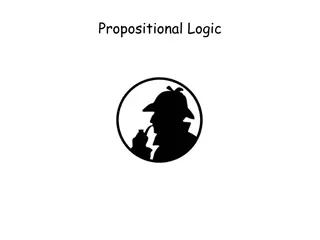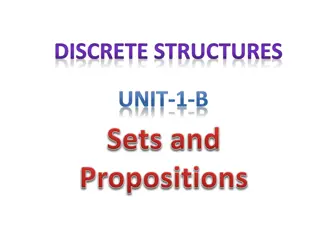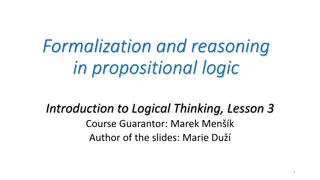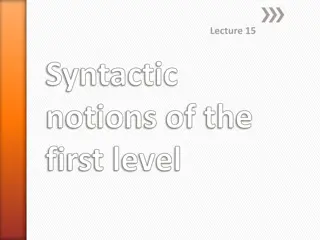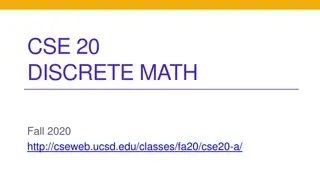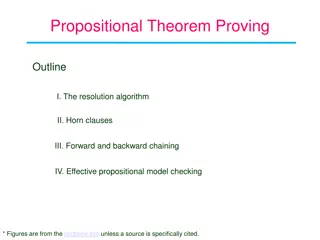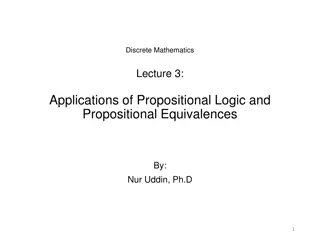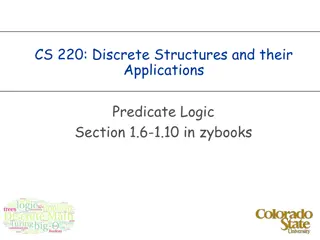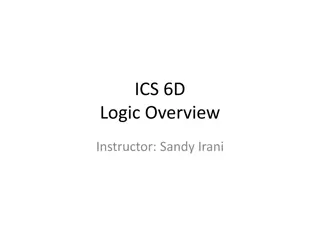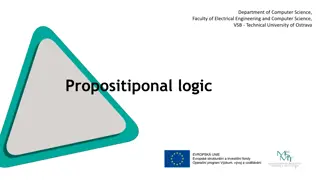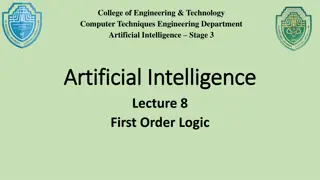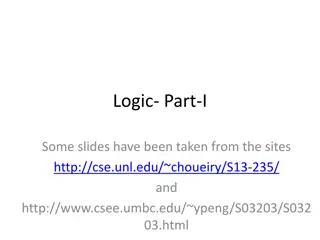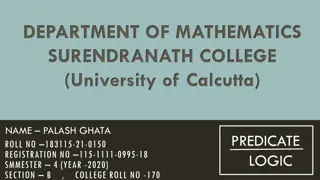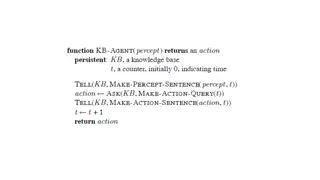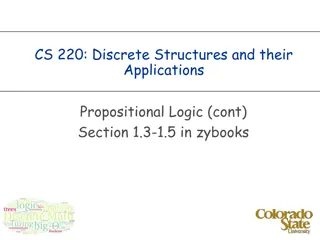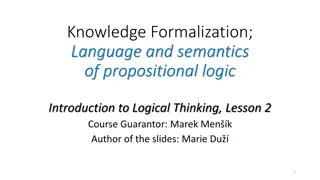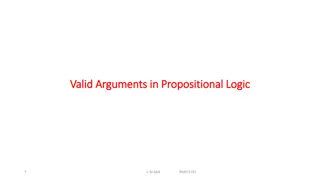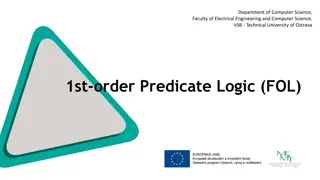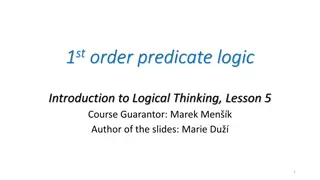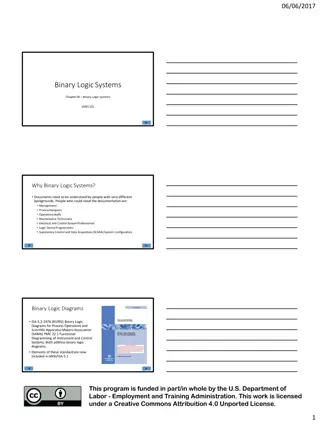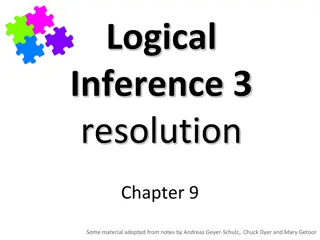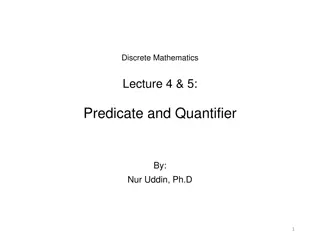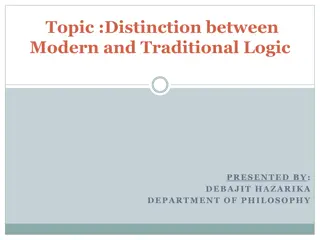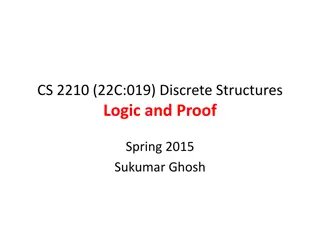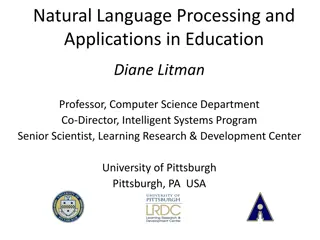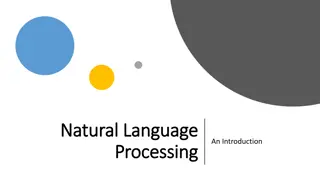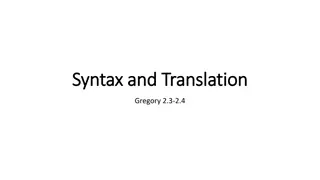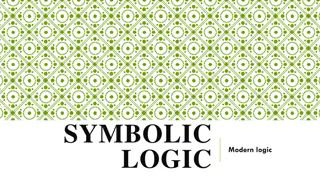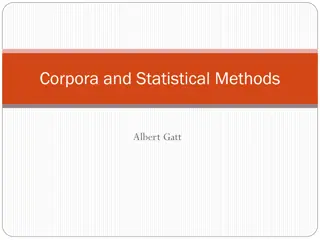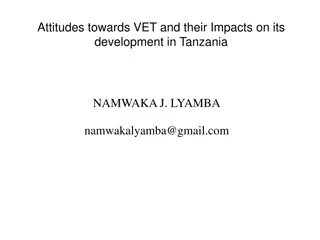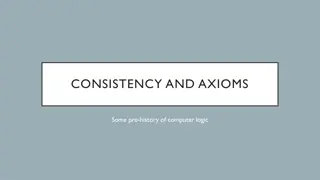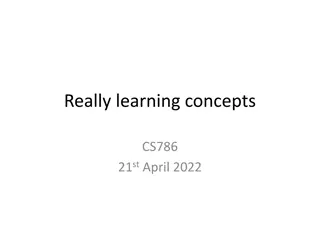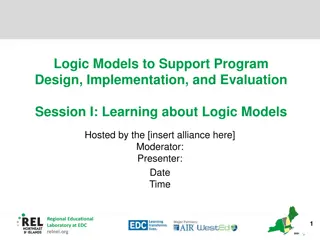Understanding Propositional and Notional Attitudes in Logic and Natural Language Processing
Explore the intricate concepts of propositional and notional attitudes in the context of logic and natural language processing. Dive into the distinctions between belief, knowledge, seeking, finding, solving, wishing, and wanting within the realms of individual intensions and hyper-intensions. Understand the variations of de dicto and de re attitudes and the implications of mathematical, logical, and empirical hyper-propositional clauses. Grasp the essence of doxastic and epistemic attitudes, where knowing signifies truth and belief may involve false notions. Delve into attitudes towards mathematical propositions, deciphering the fine line between belief in construction and paradoxical scenarios of idiocy and omniscience.
Download Presentation

Please find below an Image/Link to download the presentation.
The content on the website is provided AS IS for your information and personal use only. It may not be sold, licensed, or shared on other websites without obtaining consent from the author. Download presentation by click this link. If you encounter any issues during the download, it is possible that the publisher has removed the file from their server.
E N D
Presentation Transcript
Logic of Attitudes Natural language processing Lecture 7
Logic of attitudes 1) propositional attitudes Tom Att1(believes, knows) that P a) Att1/( ) : relation-in-intension of an individual to a proposition b) Att1*/( n) : relation-in-intension of an individual to a ; hyper-proposition 2) notional attitudes Tom Att2(seeks, finds, is solving, wishing, wanting to, ) P a) Att2/( ) : relation-in-intension of an individual to an intension b) Att2*/( n) : relation-in-intension of an individual to a hyper-intension Moreover, both kinds of attitudes come in two variants; de dicto and de re
Propositional attitudes 1) doxastic (ancient Greek ; from verb dokein, "to appear", "to seem", "to think" and "to accept") a believes that P 2) epistemic (ancient Greek; , meaning "to know, to understand, or to be acquainted with ) a knows that P Epistemic attitudes represent factiva; what is known must be true Doxastic attitudes may be false beliefs
Propositional attitudes a) The embedded clause P is mathematical or logical hyper-propositional Tom believes that all prime numbers are odd b) The embedded clause P is analytically true/false and contains empirical terms hyper-propositional Tom does not believe that whales are mammals c) The embedded clause P is empirical and contains mathematical terms hyper-propositional Tom thinks that the number of Prague citizens is 1048576 d) The embedded clause P is empirical and does not contain mathematical terms propositional / hyper-propositional Tom believes that Prague is larger than London
a) Attitudes to mathematical propositions Tom believes that all prime numbers are odd Believe* must be a relation to a construction; otherwise the paradox of an idiot; Tom would believe every false mathematical sentence Tom knows that some prime numbers are even Know* must be a relation to a construction; otherwise the paradox of logical/mathematical omniscience; Tom would know every true mathematical sentence
a) Attitudes to mathematical propositions Tom believes that all prime numbers are odd 1. Types. Believe*/( n) ; Tom/ ; All/( ( )( )): restricted quantifier; Prime, Odd/( ) 2. Synthesis. w t [0Believe*wt0Tom 0[[0All 0Prime] 0Odd]] 3. Type-checking (yourself) If the analysis were not hyperintensional, i.e., as an attitude to a construction, then Tom would believe every analytic False, e.g. that 1+1=3; the paradox of an idiot Similarly, the paradox of logical/mathematical omniscience would arise
the paradox of logical/mathematical omniscience Tom knows that 1+1=2 1+1=2 iff arithmetic is undecidable ------------------------------------------------------- Tom knows that arithmetic is undecidable Iff/( ): the identity of truth-values w t [0Know*wt0Tom 0[0= [0+01 01] 02]] 0[0= [0+01 01] 02] 0[0Undecidable0Arithmetic] The paradox is blocked; /( n n): the non-identity of constructions All true (false) mathematical sentences denote the truth-value T (F); yet not in the same way. They construct a truth-value in different ways
the paradox of logical/mathematical omniscience Similarly, an attitude to an analytically true (false) sentence must be hyperintensional; otherwise the paradox of logical omniscience (idiocy) Analytically true sentence denotes TRUE: the proposition that takes the truth-value T in all worlds w and times t Analytically false sentence denotes FALSE: the proposition that takes the truth-value F in all worlds w and times t Example. Whales are mammals denotes TRUE; Read in de dicto way; the property being a mammal is a requisite of the property of being a whale Requisite/( ( ) ( ) ); Whale, Mammal/( ) [0Requisite 0Mammal 0Whale]
the paradox of logical/mathematical omniscience b) The embedded clause P is analytically true/false and contains empirical terms hyper-propositional Tom does not believe that whales are mammals w t [0Believe*wt0Tom 0[0Requisite 0Mammal 0Whale]] Tom knows that no bachelor is married No bachelor is married iff Whales are mammals Iff/( ): the identity of propositions Tom knows that whales are mammals ??? No, not necessarily w t [0Know*wt0Tom 0[0Requisite 0Unmarried 0Bachelor]] 0[0Requisite 0Unmarried 0Bachelor] 0[0Requisite 0Mammal 0Whale] The paradox is blocked; /( n n): the non-identity of constructions
Undef/( /( properties of propositions True True, False False, Undef ) ) [0Truewt P] iff Pwtv-constructs T, otherwise F [0Falsewt P] iff Pwtv-constructs F, otherwise T [0Undefwt P] = [0Truewt P] [0Falsewt P] P,Q Requisites. [0ReqF G] = w t x [[0Truewt w t [Gwtx]] [0Truewt w t [Fwtx]] F, G ( ) Gloss. The property F is a requisite of the property G iff necessarily, for all x holds: if it is true that x is a G then it is true that is x an F Example. If it is true that Tom stopped smoking then it is true that Tom previously smoked. [0Requisite 0Mammal 0Whale] = w t x [[0Truewt w t [0Whalewt x]] [0Truewt w t [0Mammalwt x]]
Hyper-propositional attitudes c) The embedded clause P is empirical and contains mathematical terms hyper-propositional Tom thinks that the number of Prague citizens is 1048576 1048576(dec)= 100000(hexa) Tom does not have to think that the number of Prague citizens is 100000(hexa) Note that 1048576(dec), 100000(hexa) denote one and the same number constructed in two different ways: 1048576(dec)= 1.106+ 0.105+ 4.104+ 8.103+ 5.102+ 7.101+ 6.100 100000(hexa)= 1.165+ 0.164+ 0.163+ 0.162+ 0.161+ 0.160
Hyper-propositional attitudes Tom thinks that the number of Prague citizens is 1048576 Think*/( n) ; Tom, Prague/ ; Number_of/( ( )); Citizen_of/(( ) ) ; w t [0Think*wt0Tom 0[ w t [0Number_of [0Citizen_ofwt0Prague]] = 01048576]] Type-checking . yourself
Propositional attitudes d) The embedded clause P is empirical and does not contain mathematical terms propositional / hyper-propositional Tom knows that London is larger than Prague iff Tom knows that Prague is smaller than London iff Tom knows that (London is larger than Prague and whales are mammals) Implicit Know/( ) : the relation-in-intension of an individual to a proposition Explicit Know*/( n) : the relation-in-intension of an individual to a hyper-proposition
Implicit knowledge w t [0Knowwt0Tom w t [0Largerwt0London 0Prague]] --------------------------------------------------------------------------- w t [0Knowwt0Tom w t [0Smallerwt0Prague 0London]] Additional types. Larger, Smaller/( ) Proof. In all worlds w and times t the following steps are truth-preserving: 1. [0Knowwt0Tom w t [0Largerwt0London 0Prague]] 2. w t xy [[0Largerwt x y] =o[0Smallerwt y x]] 3. [[0Largerwt 0London 0Prague] =o[0Smallerwt 0Prague 0London]] 2) Elimination of , 0London/x, 0Prague/y 4. w t [[0Largerwt 0London 0Prague] =o[0Smallerwt 0Prague 0London]] 3) Introduction of 5. w t [[0Largerwt 0London 0Prague] =o w t [0Smallerwt 0Prague 0London]] 4) Introduction of 6. [0Knowwt0Tom w t [0Smallerwt 0Prague 0London]] assumption axiom 5) substitution of id.
Knowing is factivum What is known must be true Agent a knows that P P is true Agent a does not know that P P is true P being true is a presupposition of knowing Do you know that Earth is flat? Futile question, because the Earth is not flat! (Unless you are in a Terry Pratchett s Discworld ) ( )[0Knowwta P] ---------------------- [0TruewtP] Types. P ; 2C ; C n. ( )[0Know*wta C] -------------------------- [0Truewt2C]
Computational, inferable knowledge Knowexp(a)wt idiot a How to compute inferable knowledge? K0(a)wt= Knowexp(a)wt K1(a)wt= [Inf(R) Knowexp(a)wt] K2(a)wt= [Inf(R) K1(a)wt] Non-descending sequence of known hyper-propositions There is a fixed point computational, inferable knowledge of a rational agent who masters the set of rules R Inf(R)/(( n)( n)) is a function that associates a given set S of constructions (hyper- propositions) with the set S of those constructions that are derivable from S by means of the rules R Knowinf(a)wt rational a Knowimp(a)wt omniscient a
